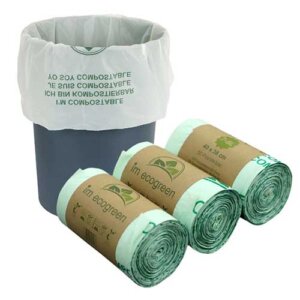Alternatives to Plastic Trash Bags with? Biodegaradable or Composting bags
December 28, 2023
Choosing an alternative to traditional plastic trash bags is a positive step towards reducing environmental impact. It is eco friendly trash bag alternatives. Both biodegradable bags and compostable bags are potential alternatives, but it’s essential to understand the differences between biodegradable and compostable bags and consider other options as well. Here’s a brief overview.
As alternatives to Plastic Trash Bags, include Biodegradable bags, compostable bags and other alternatives
Biodegradable Bags
- Pros:
- Break down into natural components over time.
- Can be made from plant-based materials, such as corn or sugarcane.
- Cons:
- May still leave behind microplastics.
- The rate of decomposition can vary depending on environmental conditions.
- Not always suitable for home composting.
Compostable Bags
- Pros:
- Designed to break down quickly and completely in composting conditions.
- Typically made from organic materials like cornstarch or PLA (polylactic acid).
- Cons:
- Requires specific composting conditions to break down efficiently (may not break down in a landfill).
- May not be suitable for all home composting systems.
Other Alternatives
- Reuse Regular Bags: Instead of using single-use bags, consider reusing plastic bags or switching to durable, reusable cloth bags.
- Paper Bags: Some people choose to use paper bags for certain types of waste. Paper bags can be recycled or composted, but their production still has environmental impacts.
- No Bag System: In some places, residents are encouraged to place their waste directly into the bin without using a bag. This might be suitable for dry waste but not for wet or messy items.
From the above information, we have learned fully about biodegradable bags and compostable bags, they have different chracteristc respectively. But taking a good consideration for environment impact for a long time. We strongly recommand compostable trash bags as alternatives to plastic trash bags, because it is best eco friendly trash bags, and almost zero contamination to our nature and landfill.
Compostable trash bags will be sustainable alternatives to plastic trash bags

Before making a choice, consider your local waste management system. Some compostable bags may not break down properly in landfill conditions in short time. They need facilities for industrial composting in designated places. But such bags can become organic matter at last. So they are best environmentally friendly trash bags.
As one biodegradable bags manufacturer , we are trying their best to improve their processing technology, make them become a qualified alternatives to plastic trash bags manufacturer. View of minimizing environment impact, biodegradable trash bags maker always take their methods to decrease the cost of compostable garbage bags, so that let more users to use eco friendly trash bags while they need deposal of trash and waste.
Of course, We can encounter some difficulties and questions when we begin to improve our production equipments and labors cost of controlling. We will do our best to decrease the cost of bags manufacturing. Expecially Our raw material, such as plant-based biodegradable material. Corn starch is commonly, it is easily purchased, and have a reasonable price , which is lower than potato powder. So we will regard corn starch as our main raw material, this will reduce the cost of compostable bags largely.
As long as the cost of compostable trash bags is decreased , people all use compostable bags, instead of traditional plastic bags. Because compostable trash bags will be beneficial for humen and nature largely.
Reducing impact of the envirionment by using compostable bags
Reduced Plastic Pollution
Traditional plastic bags can take hundreds of years to decompose, contributing to environmental pollution. Compostable trash bags, on the other hand, are made from biodegradable materials that break down more quickly, reducing the accumulation of plastic waste in landfills and oceans.
Less Dependence on Fossil Fuels
Compostable bags are often made from renewable resources such as cornstarch, sugarcane, or other plant-based materials. Such as biodegradable plastic trash bags. This reduces the dependence on non-renewable fossil fuels, which are used in the production of traditional plastic bags.
Reduced Greenhouse Gas Emissions
The manufacturing process of compostable bags typically generates fewer greenhouse gas emissions compared to traditional plastic bags. This helps mitigate the environmental impact associated with plastic production.
Support for Composting Programs
Compostable bags can break down in composting facilities along with organic waste. Using these bags supports municipal composting programs, helping to divert organic waste from landfills and promoting the production of nutrient-rich compost for agricultural use. Just as Fertilizable green garbage bags.
Healthier Soil
When compostable bags break down in a composting environment, they contribute organic matter to the soil, improving soil structure and fertility. This can lead to healthier plant growth and increased biodiversity.
Reduced Wildlife Impact
Traditional plastic bags can pose a threat to wildlife, as animals may ingest or become entangled in them. Compostable bags are less likely to cause harm to animals as they break down into natural components.
Promotion of Sustainable Practices
The use of compostable trash bags encourages individuals and businesses to adopt more sustainable practices. It raises awareness about the environmental impact of waste and promotes a shift towards eco-friendly alternatives.
Biodegradability in Home Composting
Some compostable bags are designed to break down even in home composting systems. This empowers individuals to manage their organic waste more sustainably and reduce their overall environmental footprint.
The result of testing compostable bags
As one of strongly environmental awareness pet parent, I have been used to use compostable bags in my life. Because I think that they are most eco friendly, although disposing of them can add a few processes. there no any plastic residues at last to the environment. So I like to use them to fill food and pick up the garbage, especially I more like using them to pick up dog’s waste. Moveover, During using these bags, I think that they are health to me and dogs.
Maybe I comply with the following regulations, also these bags have these features as alternative to traditional plastic bags.
Compostability Standards(ASTM D6400 and EN 13432)
There are international standards like ASTM D6400 (in the United States) and EN 13432 (in Europe) that define the criteria for compostability. These standards specify parameters such as biodegradability, disintegration, absence of harmful materials, and effect on compost quality.
Biodegradation Testing
Compostable bags should undergo testing to determine the rate and extent of biodegradation. This could involve placing the bags in a controlled composting environment and monitoring the breakdown of the material over time. Various tests, such as measuring carbon dioxide production or assessing microbial activity, may be conducted to evaluate biodegradation.
Disintegration Testing
Compostable bags should break down into smaller fragments in a composting environment. Disintegration testing involves observing the physical breakdown of the material into smaller pieces over time.
Ecotoxicity Testing
It’s essential to ensure that compostable bags do not release harmful substances into the environment during degradation. Ecotoxicity testing assesses the impact of the material and its degradation products on soil organisms and plant growth.
Chemical Analysis
Chemical analysis may be performed to identify and quantify any residues or breakdown products left behind by the compostable bags. This helps ensure that the compost generated from the bags is safe for use in agriculture or landscaping.
Certifications
Once the compostable bags have undergone testing and meet the criteria specified by relevant standards, they may be certified as compostable by certification bodies like the Biodegradable Products Institute (BPI) or DIN CERTCO.
Field Testing
In addition to laboratory testing, field trials may be conducted to evaluate the performance of compostable bags in real-world composting facilities or home composting systems.
Conclusion
While compostable trash bags offer various benefits, it’s essential to note that proper disposal is crucial for realizing these advantages. Compostable bags should be disposed of in designated composting facilities to ensure they break down efficiently and do not contaminate recycling streams.
Recommanded Compostable Trash Bags
-
 compostable trash bags 8 gallon¥0.10
compostable trash bags 8 gallon¥0.10 -
 Garbage bin compostable bags¥0.10
Garbage bin compostable bags¥0.10 -
 green earth compostable garbage bags¥0.10
green earth compostable garbage bags¥0.10 -
 Green compostable garbage bag¥0.10
Green compostable garbage bag¥0.10 -
 compostable trash bags with handles¥0.10
compostable trash bags with handles¥0.10 -
 compostable trash bags 30 gallon¥0.10
compostable trash bags 30 gallon¥0.10 -
 5 gallon compostable trash bags¥0.10
5 gallon compostable trash bags¥0.10 -
 compostable plastic garbage bags¥0.10
compostable plastic garbage bags¥0.10 -
 compostable bags for garbage¥0.10
compostable bags for garbage¥0.10








